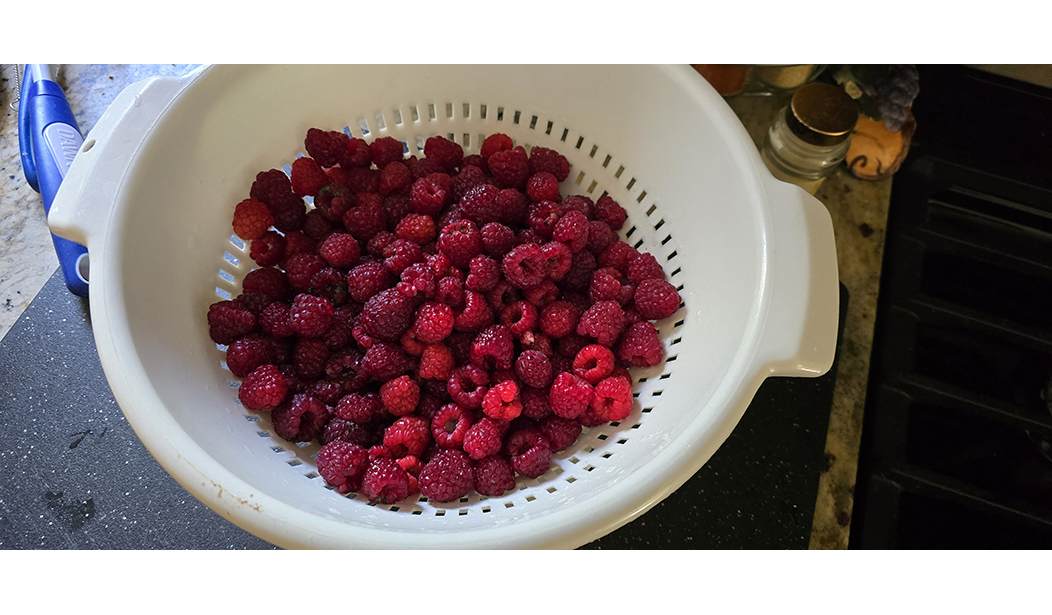Lots of people like growing their own food. It's a good, clean, healthy, outdoor hobby; it saves some on grocery bills (which have skyrocketed under Harris/Biden), and there's something great about sitting down to a meal that includes produce you planted and nurtured yourself. And self-sufficiency is never a bad thing. In fact, it's not an unreasonable outlook to note that, in years to come, it may very well be essential.
Here in our Susitna Valley homestead, we have an expansive raspberry patch. We got two gallons of raspberries this year, so will be enjoying raspberry preserves and raspberry muffins through the long, dark winter to come. We grow some chives and rhubarb as well - although it's a bit of a stretch to claim one grows rhubarb, as once it's established, the challenge becomes keeping it under control. Our neighbor's kids have a huge commercial veggie farm, and we get a lot of our potatoes, onions, carrots, parsnips, and so on from them. That's a good thing, right?
But it turns out that all of our gardening efforts may be contributing to climate change.
First: It seems composting is bad.
The authors of the Nature paper seem to have a particular down on home composting. Poorly-managed composting is said to exacerbate the release of greenhouse gases (GHGs). “The carbon footprint of compost grows tenfold when methane-generated anaerobic conditions persist in compost piles,” it says. This is particularly common during small-scale composting, apparently. With a seeming complete ignorance of how small allotments farming functions, the authors suggest that “cities can offset this risk by centralising compost operations for professional management”.
Yeah, that won't work. That's not how small farms work. The claim here seems to be a bald assertion; they are correct that anaerobic bacteria, which are the drivers of the breakdown of materials that is the point of composting, emit methane. But there's no evidence presented that these small composting operations emit gases that can be measured on a global scale - and they don't note that, absent composting, the garden and household waste normally composted would have to be disposed of in some other, non-environmentally friendly way.
Second: Watering your plants, it seems, is also bad.
Plants need water, but only the right sort of water can help save the planet. In their site samples, the researchers found that most allotment-holders use potable municipal water sources or groundwater wells. Big no, no, of course, since such irrigation emits GHGs from pumping, water treatment and distribution. “Cities should support low-carbon (and drought-conscious) irrigation for urban agriculture via subsidies for rainwater catchment infrastructure, or through established guidelines for greywater use,” it is suggested. Presumably, the subsidies will come from the magic bread tree and the infrastructure will be of the special type that does not produce GHGs.
So, an existing system is to be replaced by an entirely new water infrastructure system. As the great Thomas Sowell might ask, "To what end? At what cost?" The "Nature" piece is silent on that end. Hereabouts, of course, it's not a problem, as we get enough free, clean water falling from the sky; if there's anything Alaska has plenty of, it's water. But there is, again, no evidence presented that the relatively small amounts of water used in small gardens are significant on any scale - unlike some of the enormous commercial irrigation systems that are involved in commercial agriculture.
As is so often the case with climate scolds, this entire paper, this attack on small gardens, is just not based on facts. It's not science; it's ideology.
Many green extremists seem to take the view that anything humans do, including growing their own veg, is causing existential harm to the planet. What they really hate, some may conclude, are humans themselves. Treble bongs all round.
And that's the rub, isn't it?
See Related: Carbon Capture and Storage: An Expensive Solution Looking for a Problem
Good Idea, Wrong Reason: Hoboken, NJ Encourages Tree Planting to Fight Climate Change
Self-sufficiency is a good thing. A good thing without reservation or qualification. In these increasingly unsettled times, it may well become an essential thing. The climate scolds rail about large-scale corporate agriculture, which uses fossil fuels for not only plowing, planting, cultivating, and harvesting, but also transport. They talk a good game about "buy local," which in and of itself isn't a bad idea - but now we are to believe they're down on people growing their own food?
Let's face it, there's no pleasing these people. In their worldview, everything humans do is bad. The proper response? In this case, it's to ignore them. Keep your garden. My wife and I won't be giving up our raspberry patch, our chives, or our rhubarb for anyone - any more than I'll give up bringing in a brace of spruce grouse or a big snowshoe hare every now and then. And nobody else should, either.














